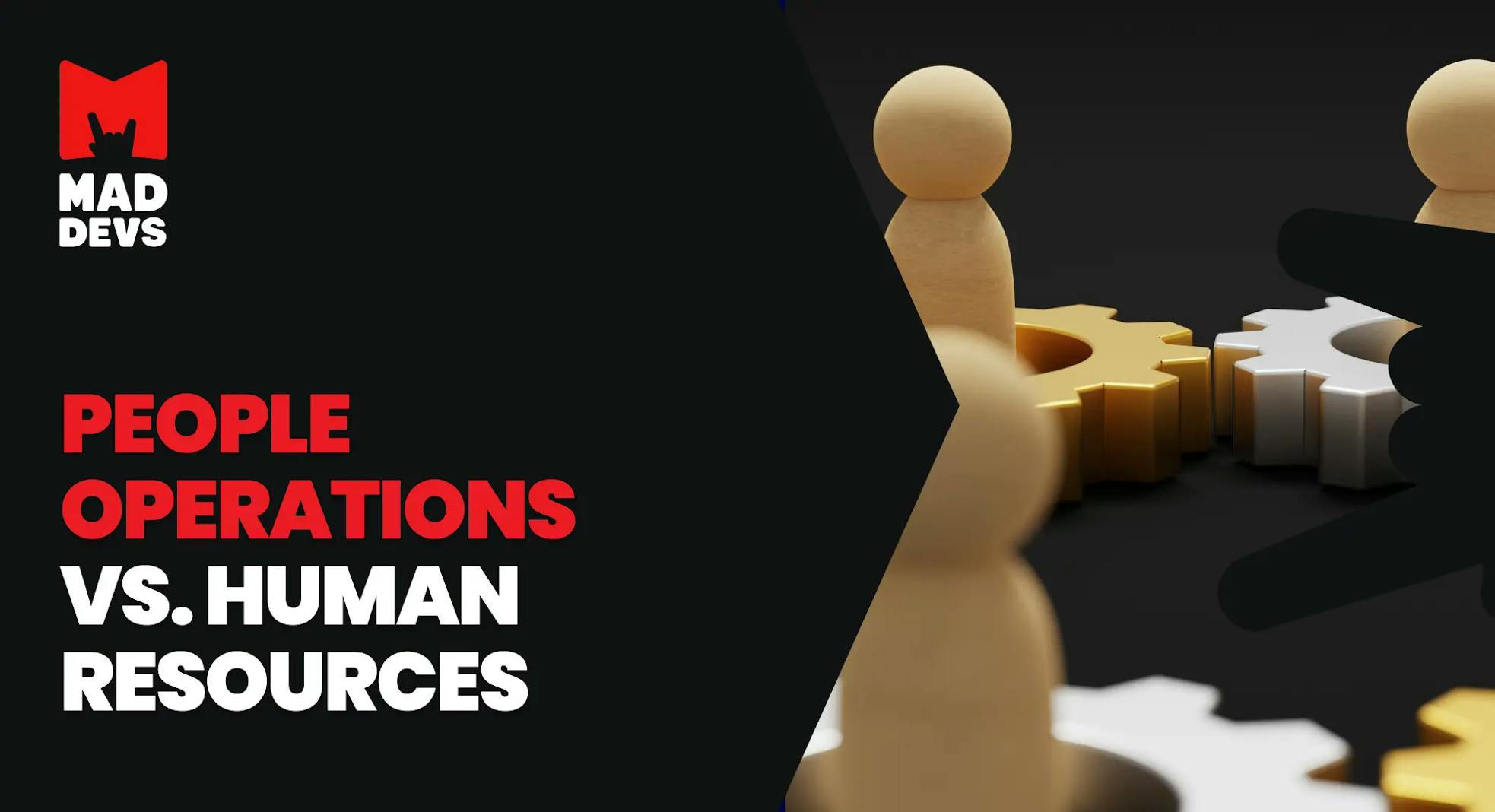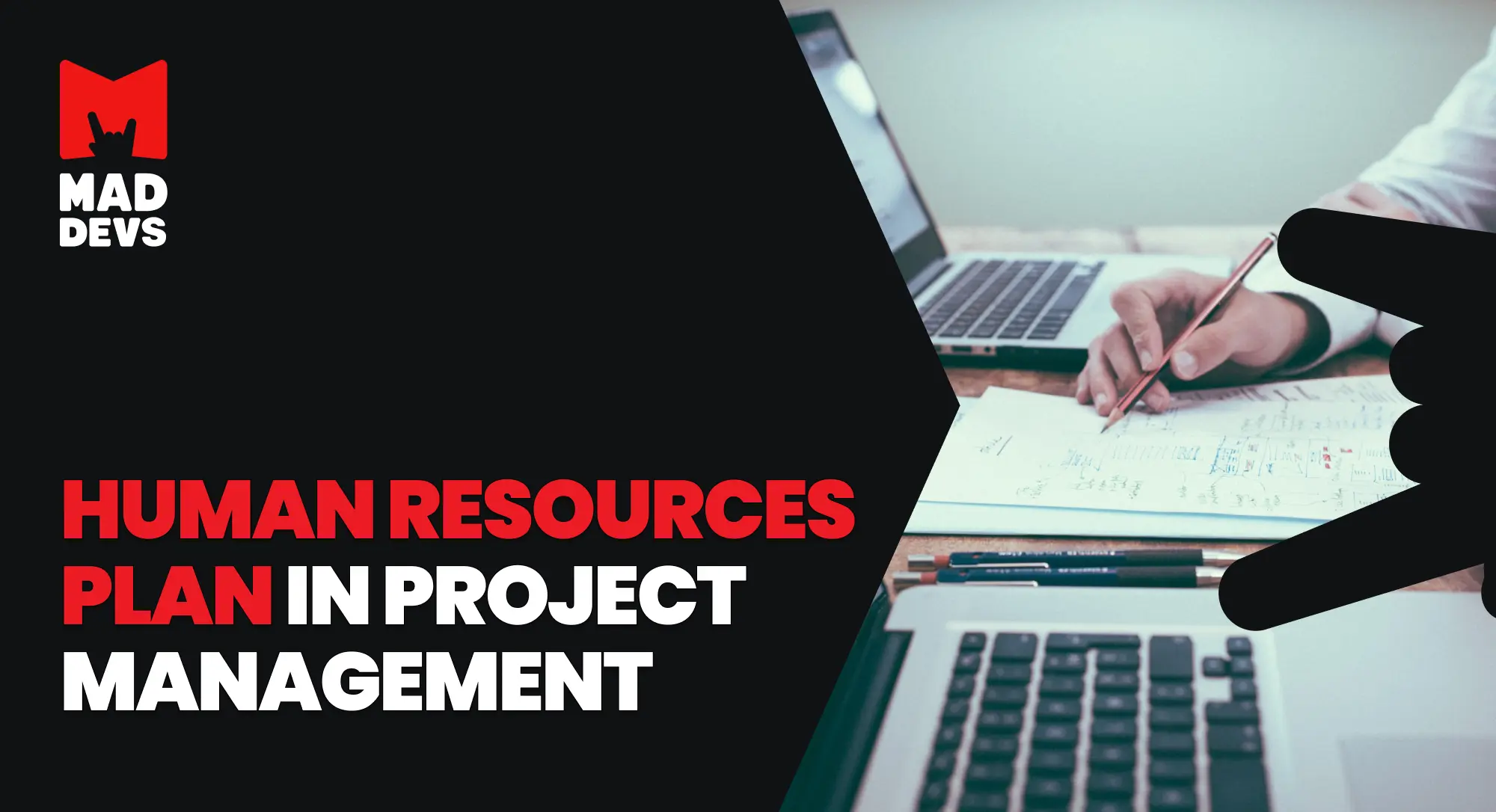Companies are realizing the value of placing people first and employees have become a vital part of the economy. This has led to the emergence of a new workforce management model known as people operations (PeopleOps, POps). At first, it seems people operations might seem like a new way to refer to HR.
This article explores the different aspects of the people operations model from the traditional HR approach. We will also talk about the various responsibilities and roles of the team and how they can be utilized to your advantage.
A brief overview of PeopleOps phenomena
The concept of People Operations was first coined by Lazlo Bock in 2006.
After he became the Head of People Operations at Google, Lazlo Bock discovered that the company's happiness index had significantly low levels. This issue was caused by the increasing number of female employees leaving the company.
Bock's transformation in 2007 made Google one of the most family-friendly organizations in the country. It also changed the dynamics of the company's people operations.
Although it's been more than a decade since the term "people operations" and the situation when Google introduced a new leave system for young parents. The popularity of this department over traditional HR has only recently gained momentum.
In today's realities, the importance of a team that is responsible for helping employees be their best at work and feel at their best is more relevant than ever. The fact is that the days of Covid have greatly changed employee behavior and perception of work. For example, Upwork did a study in 2020 that said 36.2 million Americans will be working remotely by 2025. The growth of remote work means more opportunities for workers in some ways. It has a direct impact on how employees are engaged and interested in growing the company to benefit it. And if an employee isn't invested in your company, you'll likely have to start the long hiring process to replace them.
That's why the concept of people operations has since become more prevalent in the business world.
What is PeopleOps?
The concept of people operations is a strategic approach that aims to create a culture that encourages employees to feel proud of their work and happy at their company. It involves creating an environment that encourages employees to reach their full potential. It aims to improve the company's productivity and satisfaction by focusing on the experiences of its employees.
People operations cover the various aspects of an employee's career, such as selection and recruitment, performance management, and succession planning. It can help organizations attract and retain the best talent, establish a positive work environment, and develop and retain employees.
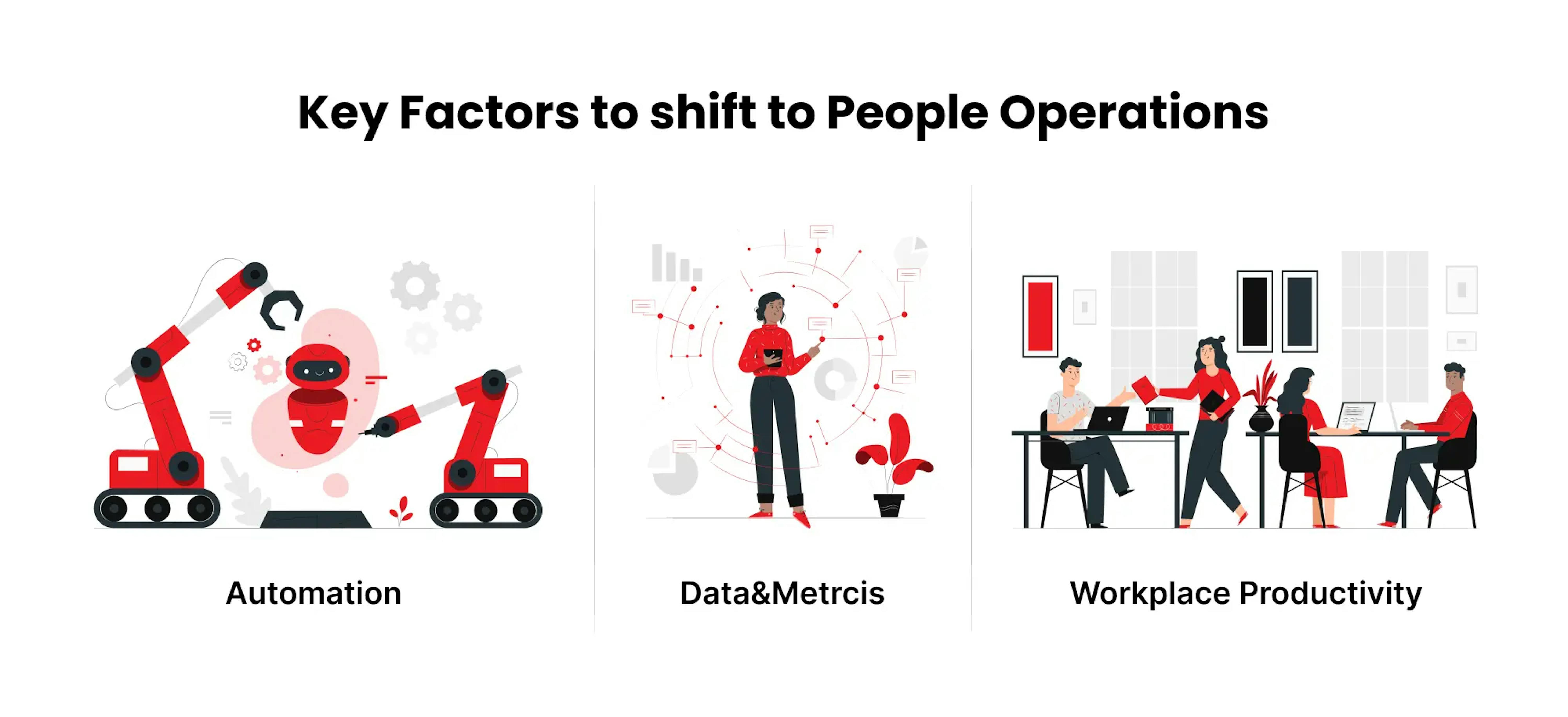
Who needs people operations?
According to studies, businesses that have a strong culture and engaged employees are more successful than those with low employee engagement.
The importance of corporate culture is acknowledged by businesses as it supports their goals and helps employees feel valued and included in the company. This is the main reason why it is important to spend time examining why a company's culture is such a vital part of its operations.
At Mad Devs, we take it seriously because our corporate culture:
- Defines the internal and external identity of Mad Devs;
- It states our core values;
- It helps us to attract and keep the best people;
- It is what transforms just a company into a team.
The way that employees are treated can have a positive impact on their actions. It can also place an organization at risk.
Gallup has conducted numerous studies on employee engagement. They have found that employees who are engaged are more likely to perform better in their organizations. The more engaged employees are also more likely to be observant of the various processes and systems of the company. When these factors are combined, the results of a business unit's performance can improve by 23%.
In addition, many companies, such as IBM and Google, have already successfully implemented People Operations models. This approach eliminates the need for traditional HR practices.
Companies often refer to their human resources and people operations departments interchangeably. Furthermore, besides people operations, there is also talent acquisition, which at first glance also overlaps with the HR area. But let's break down the functions to get to the bottom of it.
People operations vs. human resources vs. talent acquisition
These terms have some similarities since they are technically under the HR umbrella. But here is the table to look closer on each department:
| PEOPLE OPERATIONS | HUMAN RESOURCES | TALENT ACQUISITION |
|---|---|---|
| People operations creates and implements programs that shape current employees' work experiences. | Human resources is concerned with the logistics of employment. It assists a company in paying employees and complying with labor laws by focusing on tax setup, payroll, benefits, and administration. | Talent acquisition finds and hires new employees for a company. |
| Proactive—constantly works on environment and prevents the raising issues. | Reactive—solves issues that are raised by employees on the request. | |
| Hiring process—focuses on smoth communication with the applicant. | Hiring process—makes interviews and job offers, collects and tracks candidates. | Hiring process—focus on quick sourcing and hiring candidates. |
| Consulted on major business decisions. | Executes decisions made by top management. | Forecast staffing requirements in collaboration with hiring managers and executives. |
| More conceptual approach, thinking strategically about the relationship a company is building with its employees and the culture that’s being created. | Practical approach, carrying out the day-to-day employee-related activities necessary for a company to function. | |
| Work on the employees data and collect analytics about performances. | Track and analyze HR metrics. | Conduct candidate experience surveys can help to improve the recruitment process. |
People operations roles and responsibilities
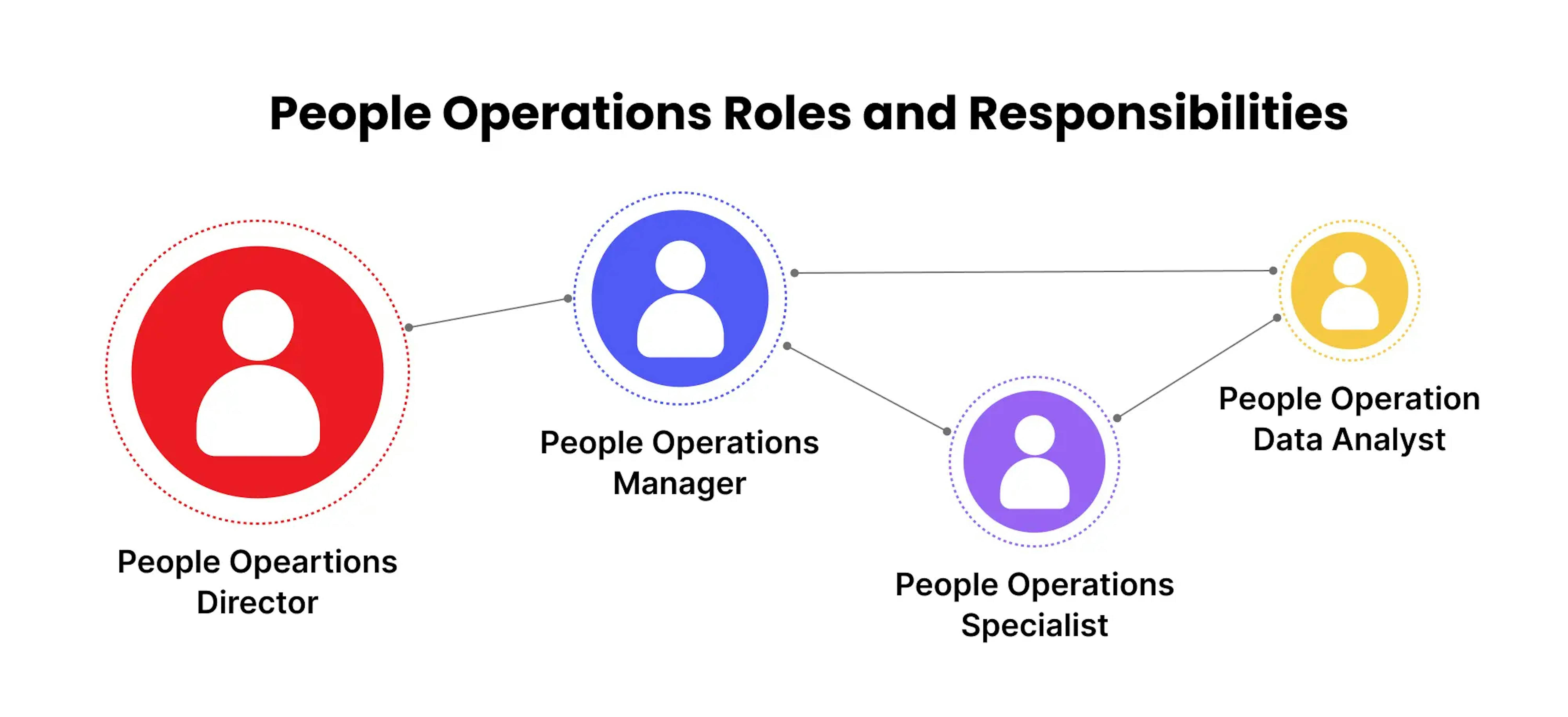
The People Operations Director is responsible for overseeing the entire people team. He or she is also responsible for developing and supporting a great work environment.
- Effectively coordinate and oversee all activities related to the people of the organization.
- Actively participate in developing and implementing policies and procedures designed to improve the organization's efficiency.
- Provide metrics and tools that will help the organization achieve its goals and improve its performance.
- Partner with managers to identify the various development needs of the organization's business units.
The People Operations Manager oversees the entire employee lifecycle, including onboarding, employee experience, and internal operations. They are responsible for connecting the organization's executive leadership with the employees.
They manage activities:
- Onboarding/offboarding
- Visa-related questions
- Payroll
- Time-off requests
- Events to promote a mission-driven culture
- Building support systems for diversity and inclusivity within the company
- Performance management.
People Operations Specialist's duties include overseeing the day-to-day perfomance of employees, as well as developing, implementing, and optimizing programs and processes.
- Document, implement, and improve processes related to the team member lifecycle.
- Focus on ensuring that the various processes related to people operations, such as onboarding, compensation, and transfers, are delivered properly.
- Provide technical and functional support.
People Operation Data Analyst is responsible for developing and implementing new reporting and analytics capabilities to support the program's operations and evaluation. They also handle ad hoc requests and work with executives and HR Partners to deliver insights using the HRIS data and the people data ecosystem.
Mad Devs' approaches to key priorities of people operations
The people operations team understands how company culture, employee engagement, training and development, recruitment practices, and other "people processes" affect the bottom line and will work with the business to develop a proactive strategy to support it.
Here are key priorities and the Mad Devs' ways to approach them.
Employee development & continuous engagement
- 1 on 1. We hold 1-1 meetings to speak with each team member individually and discuss anything that can be discussed. These meetings allow us to monitor team morale and assist with problems that our specialists may encounter. Depending on what information the PM receives after 1-1, actions are taken on how to help the employee feel better about the workplace and how to increase their engagement.
- Skill matrix. Within our company, we conduct surveys to help employees develop their skills matrix. By developing them, they are bridging the gap between what they have done and what they want to achieve.
Here you can read сomprehensive articles on the soft skill matrices that will help you and your employees assess your skills and what skills are worth boosting.
Gaining employee trust
Communicating with employees on a regular basis throughout their journey promotes an inclusive, supportive work culture and ensures that everyone is heard. At Mad Devs, we believe that trust is the key to successful collaboration. We do everything in our power to build trust between our team members. One of the most effective ways to do this is by talking. We work remotely, and effective communication is very important to us. However, in order to build trust, there must be consistency throughout the entire employee lifecycle for this goal we have:
- АМА. We hold AMA (Ask me anything) sessions with the company's founders, during which employees can ask them any question they want. Typically, questions are prepared and submitted ahead of time. However, spontaneous questions are also welcome. To increase trust in the team, the founders want to show openness to any unexpected questions.
AMA sessions are recorded and available to team members that cannot attend. These sessions are great ways to build trust and listen to your employees. They can also help you understand their expectations.
- Days off. Mad Devs has a practice of days off, which an employee can take on any day, having previously agreed with the rest of the team. These days do not affect the number of vacation days and are not deducted from the salary. This is what we do to ensure that our employees avoid burnout. And also help to build trust with the company. Our employees feel that they can always come in and honestly admit that they feel tired, mental health does not allow them to fully perform their tasks.
Change management
People Operations is in charge of managing changes throughout the organization. System updates, a shift from manual to digital ways of working, employees switching teams, management shifts in business objectives, and changes based on internal findings are all examples of this. At Mad Devs for detecting issues we use:
- MEP. We strive to provide value, and our employees are encouraged to participate in decision-making processes. The MEP (Mad Devs Enhancement Proposal) practice makes this simple. Every employee in the MEP has the ability to suggest changes or improvements to any process. Such suggestions are reviewed, considered, and, if necessary, implemented. It demonstrates that every employee is a part of the company. Our experts actively contribute to this concept.
Although an MEP is not our invention, we believe that it works because similar processes have been used successfully in other communities such as Ruby, Python, and Debian. Our company has used it, and many of the suggestions from our team members have already been implemented.
- Coaching sessions. We hold sessions with a qualified coach who helps on several fronts:
- Communication within the team
- Personal and career growth
- Define common goals and a vision for the entire team regarding their work
- And more as requested by each team.
We also have an Engineering eBook, which goes into more detail about the processes mentioned above and beyond, but also contains a huge amount of tips and tricks.
What skills are needed to master people operations?
As a leader within PeopleOps, you must pay attention to both the company's needs and the needs of the employees. While at the same time, you have to make sure that both the employees and the company feel valued and included. Having the necessary qualities to lead and manage people is very important for any organization.
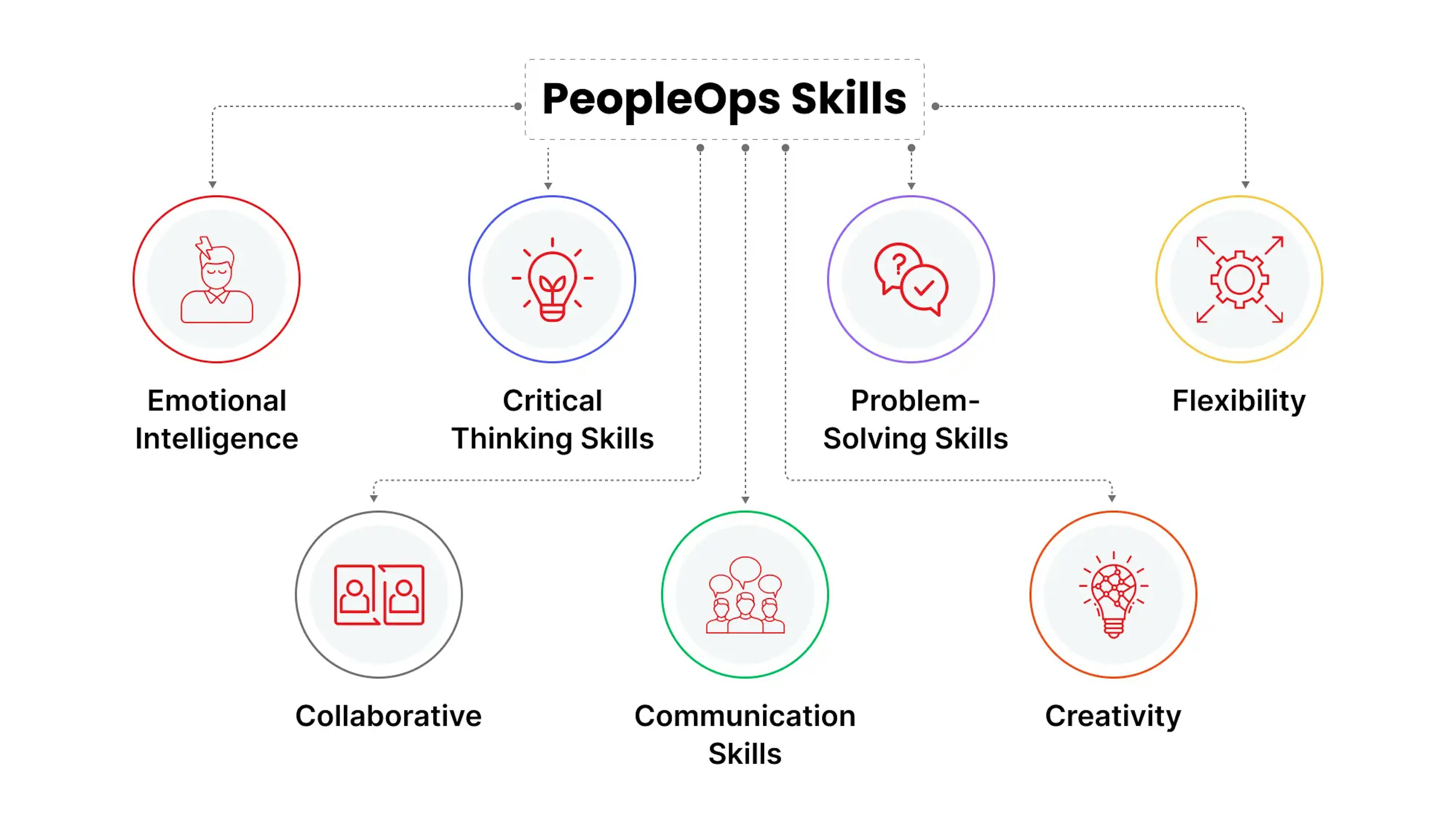
How to build people operations department In your company
A people operations function is a central component of any organization's operations strategy. It can be a single person or an entire team that's responsible for all aspects of an employee's lifecycle. But in any case, it is worth paying attention to the following points in the formation of this department in your company.
- The fundamentals
Before you start thinking about creating a people operations plan, make sure that you have the necessary HR practices in place. PeopleOps doesn't replace the need for HR processes. Ensure the following:
- Your offers are well-written, clear and error-free
- Replacing someone's role in the company is done in a timely manner and with the right candidates
- Employee career progression is smooth and transparent
- If an employee has a problem, they are always listened to and helped with
If the points above are covered, you will have a solid base for implementing the people operations strategy. - Strategy that aligns with your business goals
You should also consider implementing more equitable hiring practices and promotion procedures as part of your operations strategy. You can work with your inclusion and diversity team to implement this practice. In addition, you can consider investing in technology to improve your remote workforce experience.
Mad Devs is a remote-first company, and we have a strong remote work policy. We have material to help you review the guidelines that help us build effective processes for our employees who work in a wide variety of countries.
Your people operations team can help ensure that your processes are aligned with your company's goals. - Diverse team is a key
PeopleOps team members should not necessarily come from HR backgrounds. Instead, they should have high emotional intelligence and be capable of solving analytical problems. Employees with these traits can come from various fields, such as finance, sales, engineering, PR, and legal. - Streamline and optimize your HR systems and processes
PeopleOps must be able to analyze and make data-driven decisions to create an exceptional work experience. This involves replacing outdated processes and systems, like your survey software and applicant tracker, with modern approaches to people analytics and collecting employee feedback. Having these systems will make it easier for them to anticipate and respond to employee needs. Also employee experience managers can help even more effectively debug these processes, because their scope includes gathering feedback from employees on their work experience.
At Mad Devs we have Enji that is responsible for automating processes. This tool helps collect data for HR, project and margin reports, track alerts, business goals, each employee's workload, store payroll data, and more.
Conclusion
The success of an organization depends on its people. They are the people who create ideas, develop strategies, and drive the company forward. Organizations have to treat their employees like customers to be the best version of themselves.
The goal of PeopleOps is to make sure that businesses adopt the people-first approach, which will likely save them a lot of money on hiring and training. Happy employees are more likely to stay where they are. Employees' personal needs are also taken into account when it comes to working.
If you are in need of technical assessment and consulting, feel free to contact us. We will gladly assist you as soon as possible.

